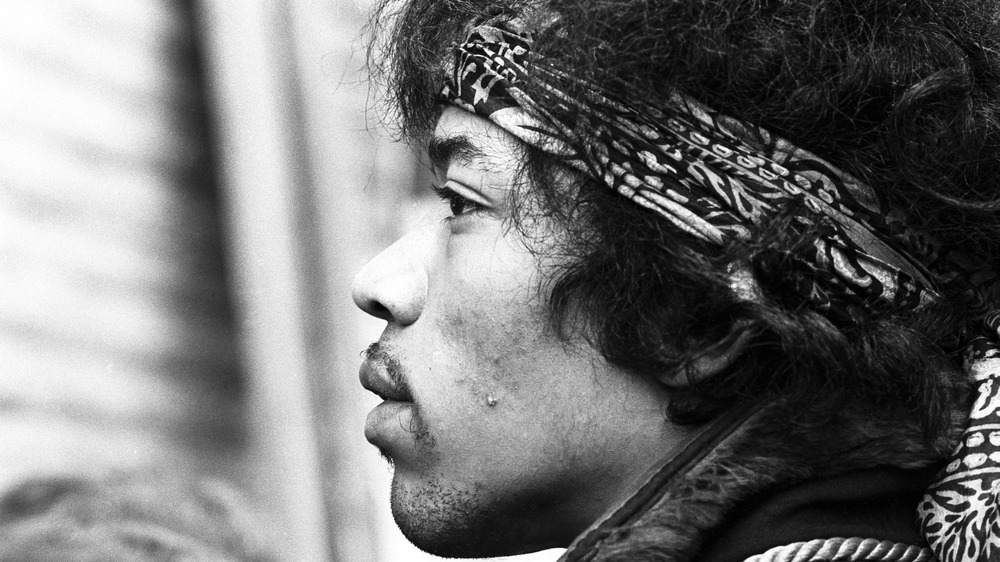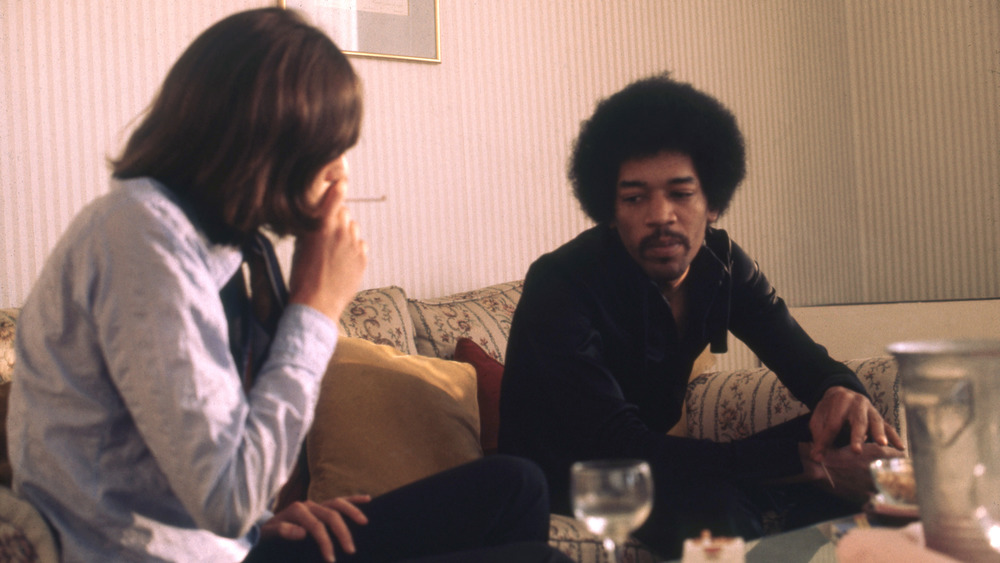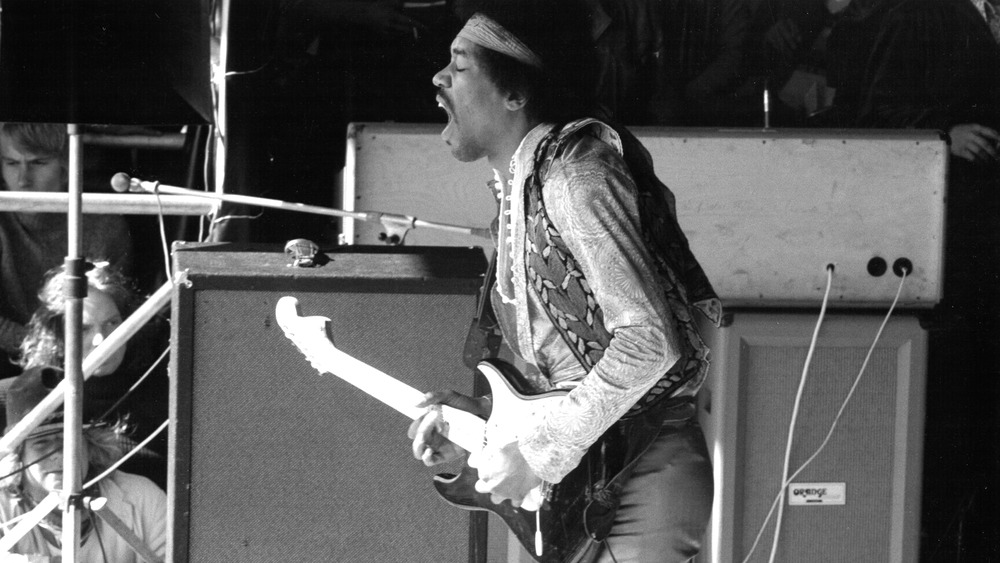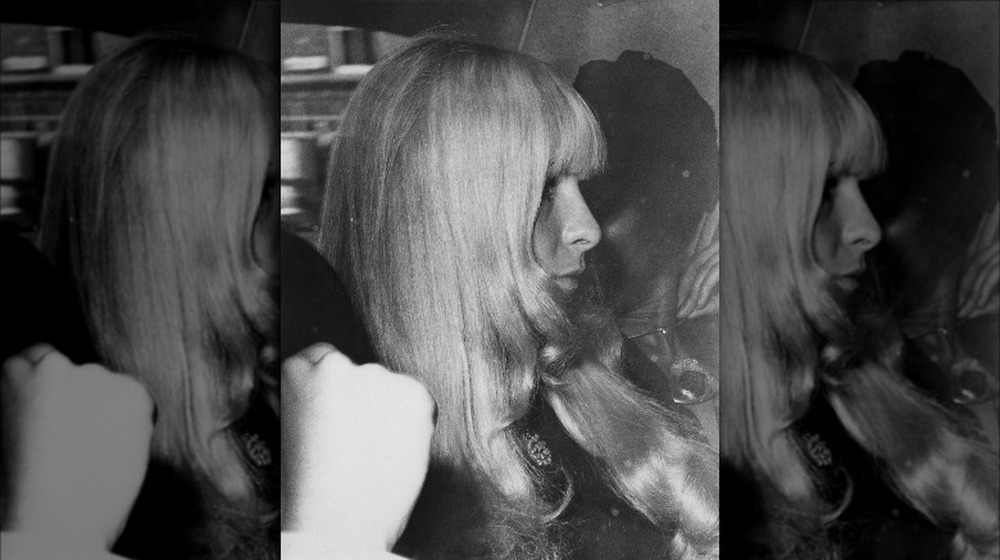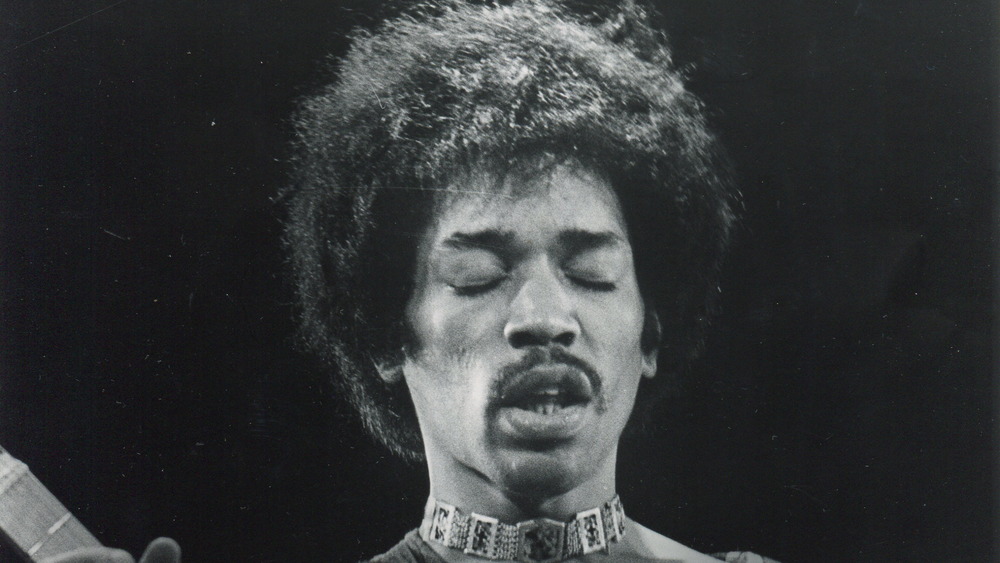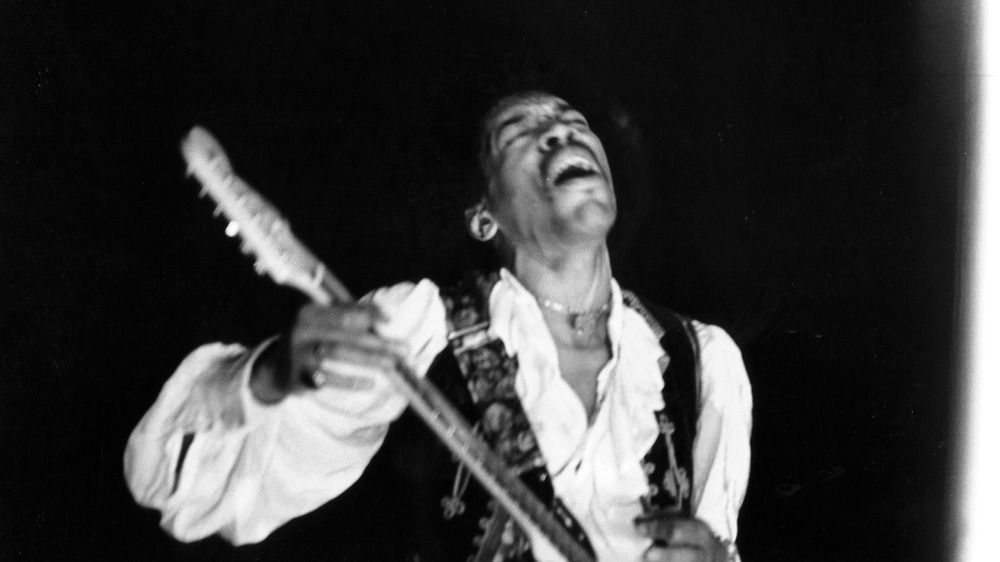The Tragic Death Of Jimi Hendrix
Although December 31, 1969 was technically the end of the '60s, two events in 1970 signaled the end of a decade dedicated to the countercultural ideals of love, freedom, and creativity more than any other. The first was the break-up of The Beatles, which hit the headlines following Paul McCartney's official statement to the press that he was leaving the band on April 10, 1970. The second, which occurred on September 18, was the tragic death of Jimi Hendrix.
Over the course of just four years, Hendrix made himself into an icon, thanks to a spate of highly influential recordings and countless era-defining live performances, including slots at some of the world's most legendary music festivals: Monterey Pop in 1967, Woodstock in 1969 and, just a month before his death, the UK's Isle of Wight Festival, according to Billboard.
The comedian Bill Hicks, who was a massive Jimi Hendrix fan, famously proclaimed (per Southwest Review): "Hendrix was an alien, okay? His ship landed, they said, 'Jimi, show 'em how it's done and we'll pick you up in twenty-eight years.'" But as his early death revealed, as otherworldly as Jimi Hendrix both appeared and sounded, he was, at the end of the day, tragically human.
Jimi Hendrix was in bad shape
It is tempting to think that Jimi Hendrix was born to be a rock superstar, that his unbelievable natural ability and genre-bending idiosyncrasies would ensure his greatness, whatever might befall him. But the reality was that during those brief few years in which Jimi Hendrix had taken the world by storm, the guitarist had worked himself to the bone.
Hendrix's career began on the East Coast, where he played for a number of bands — including that of his great hero Little Richard – before finally being discovered by the British musician Chas Chandler, bassist of the Animals, who saw Hendrix's enormous potential and took him off to England to form the Jimi Hendrix Experience. It was British audiences who first warmed to Hendrix when he couldn't catch a break in America, and his seemingly effortless cool both onstage and off masked a grueling schedule of touring and recording, aimed at elevating Hendrix to the international rock music pantheon.
But by 1970, Hendrix was almost completely used up. As reported by the Independent: "He also had a propensity for hedonism and excess which saw him, come the late summer of 1970, in a dangerous state of flux."
The final days of Jimi Hendrix
That Jimi Hendrix had pushed himself too far was reflected by his poor health, but also in his labyrinthine financial situation and his numerous, clashing social entanglements. All of these would come to a head in 1970, piling enormous strain on a musician at a moment of great physical and emotional weakness. According to ABC, Hendrix himself was well aware of the precariousness of his situation, uncannily telling a reporter in an interview at the time: "I'm not sure I will live to be 28 years old."
"With his Jimi Hendrix Experience group disbanded, major festival shows marred by his drug-taking, his health deteriorating and the working relationship with his manager Michael Jeffery — a controlling, mob-connected figure who worked Hendrix to the brink of exhaustion and kept the guitarist's finances opaque at best — on the verge of collapse, he told friends and journalists that he felt aimless, hounded and unable to trust anyone around him," the Independent reports.
Hendrix's social circle was shifting and unstable — life on the road tends to do that — and the person he shared the last of his life with was, reportedly, a new acquaintance: Monika Dannemann, whose behavior around the time of Hendrix's death has been the cause of much speculation.
Jimi Hendrix died in Monika Dannemann's hotel room
Monika Dannemann was a German figure skater who became close to Jimi Hendrix — her musical idol — after meeting him following his 1969 concert in Dusseldorf and spending subsequent days and nights together in Hendrix's European tour. But as noted by Rocks Off, many commentators have argued that Dannemann's account of her relationship with Hendrix is unreliable: Dannemann claimed that she and Hendrix were engaged, deeply in love, and had been in a committed relationship for 18 months at the time of his death. However, many in Hendrix's social circle have contested this, claiming that their relationship was far more casual, as evidenced by Hendrix's liaisons with numerous other women in the final months of his life.
Whatever the exact nature of their relationship might have been, it is to Dannemann that Hendrix turned that fateful night — overworked, worn out, and at the end of his tether. Details are sketchy, but the official story goes that Dannemann had come to London to reconnect with the legendary guitarist, and was staying at the Samarkand Hotel in Notting Hill while attempting to pin down Hendrix. Hendrix had been previously taking amphetamines, and, findng he was unable to sleep at Dannemann's hotel suite, took 9 of her's Vestarax sleeping pills — 18 times the recommended dose.
"What no one can deny is that she was with him the night he choked to death on his own vomit," claims the Independent.
Was Monika Dannemann responsible for Jimi Hendrix's death?
As the circumstances of Hendrix's tragic death flooded the newspapers in the days and weeks following, Dannemann, as the last person to see the rock star alive, was given a huge amount of visibility — and notoriety. Per the Independent: "With some, that fact bestowed on Dannemann instant quasi-religious status. To others, she was for ever the focus for suspicions surrounding the circumstances of Hendrix's death."
Like her claims as to the nature of her relationship with Hendrix, Dannemann's testimony concerning what exactly happened the night of Hendrix's death — which, it has to be said, she made something of a career out of recounting — was wildly inconsistent. In some stories, Dannemann claims to have left the hotel room early in the morning to buy cigarettes, and her account of what she found on her return changes. "Having found Hendrix unresponsive, either dead or near death, she claimed she rang an ambulance some time between 9 a.m. and 11 a.m. Later, she insisted Hendrix was alive as he was loaded into the ambulance," per ABC.
Some have speculated that Dannemann may have purposefully delayed in calling for an ambulance to give her time to clear the hotel room of narcotics and cover up evidence of drug-taking. Per the Independent, Hendrix's friend Eric Burton has claimed this was the case, and that he helped to clean the apartment, but his story has also changed in the intervening years, making his recollections suspect.
Was Jimi Hendrix murdered?
As fans around the world struggled to come to terms with the death of Jimi Hendrix, arguably the greatest hero of the '60s counterculture, stories concerning his death — and who might have instigated it — began to circulate, stories that matched the period in which Hendrix lived in terms of sheer left-field wildness. Quite possibly, these stories had their root in the unreliability of Dannemann's account of the events of Hendrix's death, as well as that of other members of Hendrix's inner circle who were supposedly "in the know," such as Eric Burton.
One of the most notorious theories was that Hendrix was in fact murdered by his manager, Michael Jeffrey, from whom Hendrix was attempting to extricate himself at the time of his death. The story made headlines in 2009, thanks to a book written by former roadie James "Tappy" Wright, which claimed that Jeffrey had confessed to the murder in private prior to his own death in a plane crash in 1973, per the Guardian, which reports that Jeffrey told Wright: "We went round to [his] hotel room, got a handful of pills and stuffed them into his mouth ... then poured a few bottles of red wine deep into his windpipe."
Other suspects that have been posited by conspiracy-minded Hendrix fans include the mafia — who had reportedly kidnapped Hendrix the previous year during a drug sale, per Rolling Stone – and even the FBI, per Newsounds.
